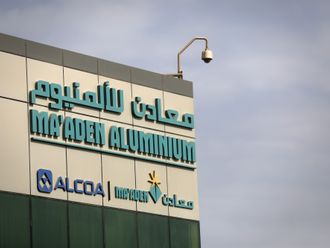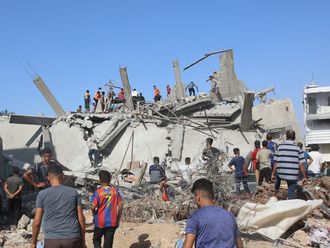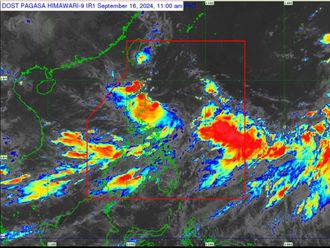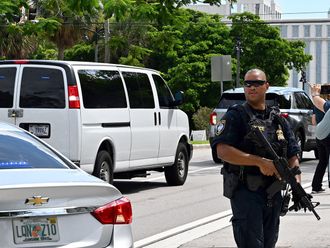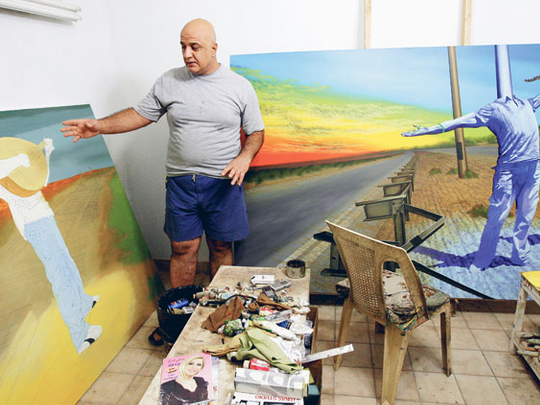
Baghdad: Iraq's artists are using their work to try to process the turmoil since the 2003 US-led invasion, and what they are producing shows a profound anger over their country's traumas and uncertainty over its future.
They have a lot to deal with: A change of regime, foreign occupation, an insurgency, sectarian massacres and, now, the prospect of a divided nation left by the Americans in the hands of unpopular politicians, unprepared security forces and a fragile democracy.
The ambivalence is clear.
Many of the artists lament Saddam Hussain's ouster but don't wish to see one day of his rule come back. They are grateful to America for having rid them of his tyranny but they vilify it as a foreign occupier. The majority Shiites see justice in their post-Saddam empowerment after decades of oppression, but say their own politicians are ruining the country.
"The Iraqi people are victimised by everything and everyone," declares Fadel Saddam, who directs short films. "They are victimised by both the ruler and the foreign occupier."
Muayad Mohsin is venting while he paints.
"What we need in Iraq is a ruler who shares Saddam's tyranny but who fights oppression and corruption and champions the poor," he barked in one of several outbursts to an Associated Press reporter as he worked on his latest canvas.
It was another of the all too frequent 110-degree days when electricity is out and fans and air conditioners sit useless. Mohsin's stuffy, sparse apartment was covered in dust from the previous day's sandstorm, and the heavyset Mohsin, in shorts and a T-shirt, repeatedly wiped the sweat off his face.
The merciless heat is even enshrined in his work. On the back of one canvas is written: "Painted in 48 Celsius in the shade (118 Fahrenheit) while the power is continuously out in the summer of Iraq."
Like many Iraqis, the 47-year-old Mohsin is filled with anger and feelings of betrayal. He blames everyone and everything for Iraq's present predicament.
The work in progress depicts a man standing desolately by the side of a road that bends until it disappears into a burning, apocalyptic orange sunset. The man is headless, holding in his left hand an oud, the Middle Eastern lute-like instrument that holds a cherished place in Iraqi culture.
In place of the man's head is a street light pole.
"He is screaming, How long will we stand still like light poles on deserted roads?" explained Mohsin. "The sunset gives the impression of the end of the world, the end of a conflict, a horizon that promises new but not necessarily good things."
Mohsin hauls other paintings from a store room. One also shows a headless man _ "The head represents rationality, but we Iraqis are headless because of our sectarianism," Mohsin said _ standing by a railway that abruptly ends behind him. His body is cracking, as if about to crumble. In the background are the famed ruins of Babylon.
"Before the Americans invaded, we had Saddam and his Baath Party. Now, we have several Saddams and several Baath parties," Mohsin said.
His next work, he says, will be about President Barack Obama.
It will depict him shooting hoops. The hoop will be hanging from a wall depicting the mythological winged bull of Assyria. The Statue of Liberty will be in the background, its back turned on the US leader.
At 30, Omar Al Saray already is a prize-winning poet, published literary critic, popular college lecturer and chairman of Baghdad's prestigious Society of Iraqi Poets.
Murderous force
But none of those lofty distinctions could help him when Shiites and Sunnis turned against each other in Baghdad with murderous force in 2006 and 2007. Like the hundreds of thousands who feared for their lives, Al Saray fled the country, travelling in Syria and Lebanon for four months in 2006 after suspected Shiite militants left a threatening note on his doorstep.
The note was weighed down by a bullet, a common militant signal: leave quickly or die.
Ironically, Al Saray is a Shiite, though a secular one. The militants assumed he was Sunni because his first name, Omar, is rarely given by Shiite families to their children.
"The sectarian violence has divided the city into cantons and a man's name has become a problem," said Al Saray, mourning a bygone Baghdad where religious tolerance prevailed over sectarian boundaries.
The blood-soaked days of the sectarian violence' height in 2006-2007 are gone, and Al Saray is taking advantage of Baghdad's current relative security. Still, the young poet is less than happy with his country's state.
"The future is scary. The Americans are leaving after they have destroyed so much. They never solved anything. They occupied us, but never took us to the safety of the shore."


